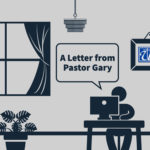
We study the past, which we call history, in order to prevent making the mistakes made in previous times in our own time and in the future. At least, that is the theory….too often it would seem we may study the past, we just refuse to learn from it.
What about you and I…do we look at our past to learn from it, or to try and live in it? For many the past is a time of great nostalgia. Many others see their past as difficult and seem to want to wallow in it and often try to drag the rest of us into their self-pity. Still others work hard to ignore their past and struggle to break free from it.
It appears to me that many life lessons for today can be learned by looking at our past. How have major events perhaps impacted us to shape just a bit of who we are now? As I write this, it is the 80th Anniversary of the attack on Pearl Harbor. What an impactful event for millions! Just the shock and fear alone had the power to impact people. The lives of loved ones gone to war following December 7 piled on the emotional baggage carried from that day.
Later generations had the assassination of President Kennedy and/or the tragic day of 9-11 to touch them. I think of most of our students here now, born right before or after 9-11. The emotions of the day did not impact them directly. Yet if parents had become more fearful, may it have changed how they raised their children? The children, then, could have been impacted by something beyond their personal awareness. We can only wonder what forces have been unleashed by the COVID 19 pandemic that will affect todays and future children and adults.
Each of us have our own histories to add to those outside forces at work on us. Some are joyful and happy stories. Others might be sad or even tragic. We are a collage of people and events that have been part of the “some assembly required” that has been and is at work molding who we are and who we are becoming.
As people of God, what we see in our past need not be something we now fear to review. It is past. It’s time of shaping us has passed. We can look at times, people, and events that are over and learn from them. Part of that learning can be to work hard to avoid somethings in the present and future. Part of that learning can be to keep going with the good things from our past that are still working. And part of that learning can be that somehow, we have worked through a number of these things and they no longer are a threat to our being. We are free to be a new person, not held back by our or any past.
One of John the Baptist’s cries in Advent is repentance. Repentance is expressing sorrow for some things in our past and present. It is an effort to literally fight to turn around and learn from our ways of sin in hopes of having learned something and committing ourselves to no longer sin these sins again. Not repeating is a form of repentance.
This same John who calls all to repentance proclaims of One who is coming. The repentant John is not even worthy to tie this One’s sandals. So much for perfect repentance even for the preacher of repentance. Maybe, as John looks at his own past and present his humility is because he is a preacher of repentance and thinks he ought to do better.
Looking back to learn so as not to repeat but repent is a healthy form of spirituality. It is only unhealthy when we decide to stay in our past to either glorify it or wallow in it. Either way we are stuck there. Repentance is a hopeful act, appropriate for Advent’s hopeful time and spirit. It is the hope of not being stuck but instead being free to move ahead. Allow the past to speak. Learn from its lessons. Move away from it and move ahead into the future, into God’s future. Work to create a new and better past.
